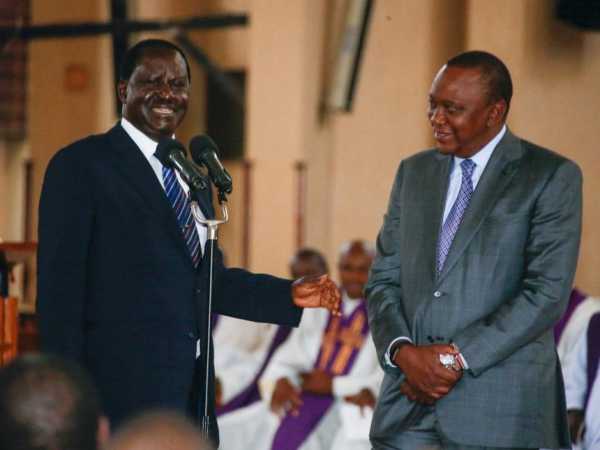
Opposition leader Raila Odinga today holds an urgent meeting of Cord MPs and governors to thrash out complaints the IEBC deal gives sweeping power to the President to pick the commission.
This and other proposals will be debated today in Parliament.
Some ODM members say James Orengo’s team did not push Jubilee hard enough in the Joint Select Committee, so the ruling coalition got its way on many issues.
In the deal reached last week, President Uhuru Kenyatta Uhuru will be given a list of 11 candidates by the IEBC select committee and will choose seven for the seven-member commission. He will discard four names.
The deal to be approved by Parliament also gives the head of state power to pick one of two candidates as IEBC chairman.
The report publicly endorsed by ODM chief Raila — except for Uhuru’s all-powerful role — sent shock waves through Cord. Critics say negotiators have tilted the 2017 race in Jubilee’s favour.
The move has divided Cord and some MPs say they will kill the report and the committee’s two bills to be debated today in the National Assembly and Senate.
Some Cord lawmakers have turned their guns on Orengo, accusing him of ceding too much ground to Jubilee, despite protests by some on his committee.
“After conducting interviews…the selection panel shall select two persons qualified to be appointed as chairperson and nine persons qualified to be appointed as members of the Commission and shall forward the names to the President for nomination of one person for appointment as the chairperson and six persons for appointment as members,” the Election Laws (Amendment) Bill, 2016, states.
Last Wednesday, Raila did endorsed recommendations by the IEBC committee but said the President should not play a role in appointing commissioners.
“I would not want the President to have a role in selecting IEBC commissioners but I hope he will find it necessary to consult me,” he said.
It appears Raila’s concern was not understood by the public, as the provision on the President’s role is buried deep in the voluminousbill.
Grumbling opposition lawmakers are yet to come out publicly to talk about the President’s powers.
“Raila himself is shaken to the core. Jakom couldn’t believe Orengo allowed Uhuru to appoint commissioners,” a source familiar with behind-the-scene intrigues told the Star.
Suna East MP Junet Mohamed, a Cord negotiator, reportedly stormed out of a final session to protest concessions to Jubilee.
Today, Cord’s Parliamentary Group meeting will be co-chaired by Raila, Wiper Leader Kalonzo Musyoka and Ford Kenya’s Moses Wetang’ula. Issues in the report will be thrashed out.
The meeting, including Cord governors, will be held at historic Ufungamano House in Nairobi.
Already, six Nyanza MPs have rejected the report, saying only a new voter register can fix inaccuracies in the IEBC
database.
The joint committee, however, endorsed a plan to have the register scrutinised in a forensic audit by a “firm of international repute”.
ODM national chairman John Mbadi (Suba), Peter Kaluma (Homa Bay town), Opiyo Wandayi (Ugunja) Nicholas Gumbo (Rarieda) and Fred Outa (Nyando) opposed a forensic audit.
“We do not need a forensic audit.Our push for a new one is non-negotiable and the parliamentary team should have known this early enough,” Mbadi said last week.
Last year, Jubilee lawmakers slipped a provision into the Judicial Service Commission Act allowing Uhuru to chose the next Chief Justice from three nominees.
The provision was nullified by the High Court, declaring it unconstitutional and a violation of the principle of separation of powers.
Yesterday, lawyer Harun Ndumbi told the Star that ideally the IEBC selection panel should give Uhuru only seven names, recalling the High Court decision on CJ selection by the head of state.
“In order to ensure transparency and accountability, it’s important the role of the President is reduced significantly so people can trust the institution that has been created,” Ndumbi said.
“They are giving him [Uhuru] powers to exercise discretion, which is partisan, and therefore in a sense the President becomes an interested party in the decisions he is making. This is why I think it was outrightly wrong because we are setting [up] a political crisis.”
In 2007 President Mwai Kibaki single-handedly picked members of the old Electoral Commission of Kenya. That decision is partly blamed for the country’s descent into bloodshed after bungled presidential polls.
Cord initially had pushed for the new electoral body chosen by political parties in accordance with their numerical strength in Parliament. The opposition made concessions, however, agreeing the commission will be recruited by a panel of nine.
Four people would be nominated by the Parliamentary Service Commission, one would be nominated by the Kenya Conference of Catholic Bishops.
The National Council of Churches of Kenya is to pick one person, while two would separately be nominated by the Evangelical Alliance of Kenya and the Hindu Council of Kenya.
The last person would be nominated by the Supreme Council of Kenya Muslims, the National Muslim Leaders Forum and the Council of Imams and Preachers of Kenya.
But there are concerns, not expressed publicly, the church hierarchy involved are dominated by individuals from the Mount Kenya and likely to favour the President.
On Saturday, Orengo said those complaining Cord lost out in the negotiations were “locked in darkness of cynicism and skepticism”.
“You hypocrites! You unbelievers! The Report and Draft Bills are a result of hard negotiations carried out against the backdrop of great sacrifices and heroic struggles of our people who died for freedom,” Orengo said.
“Cord’s pathway to electoral victory has been safeguarded now and protected by a revolutionary change of the election laws that constitutes both a qualitative and quantitative leap in the electoral system.”









